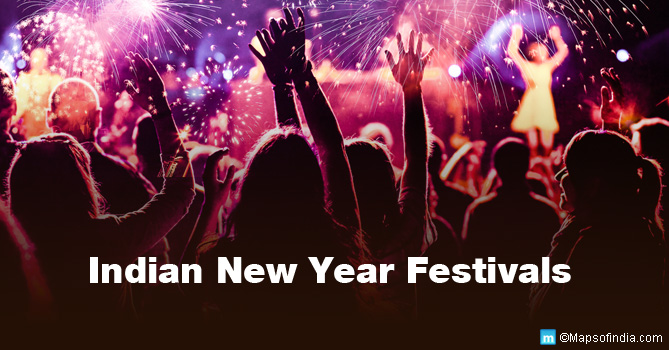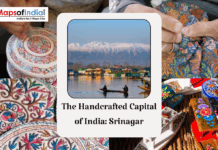2016 quickly draws to an end and 2017 is right round the corner. You must have some great New Year Eve parties in mind. You might also have planned to celebrate the start of the Gregorian calendar in the capital of parties – Goa. Well, fret not if you have no such plans, as this is not the only New Year celebration in India.
In a multi-cultural, multi-ethnic and multi-religious country like India, it is but natural that numerous calendars are followed. Some of them are religious calendars such as the Islamic lunar calendar, while others are culturally different but based on the Hindu calendar. New year celebrations across the country, too, are just as colourful and diverse. Let us take a look at the major New Year celebrations held in different parts of the country.
Ugadi (28 March, 2017) – Ugadi or Yugadi is the New Year celebration of Andhra Pradesh, Telengana and Karnataka. It is the start of the Chaitra month and is celebrated with a grand family feast. People don new clothes and visit relatives on the day. It is the beginning of the Hindu lunisolar calendar. Traditional sweets and pachidi (sweet syrup) – made with raw mangoes and neem leaves – are served with the Ugadi meal.
Gudi Padwa (28 March, 2017) – The new year of Maharashtra, Gudi Padwa usually falls on the same day as Ugadi. Gudi Padwa is celebrated by hoisting traditional green and yellow flags called Gudi in Maharashtrian households. The day denotes the victory of Chatrapati Shivaji Maharaj over his enemies. It is also the celebration of Shalivahan’s victory over the Sakas (start of the Saka era). Garlands made of neem and mango leaves and marigold flowers are hung on the Gudis.
Sajibu Nongma Panba (28 March, 2017) – Sajibu nongma panba, the New Year celebration of the sanamahism followers of Manipur also falls on the same day as Ugadi and Gudi Padwa. Traditional offerings are made to the deity, Lainingthou Sanamahi, and then consumed by the family.
Vaisakhi (14 April, 2017) – Vaisakhi or Baisakhi is the harvest festival of Punjab that also commemorates the first day of the Vaisakh month (according to the solar calendar followed in Punjab). The Sikh community of Punjab celebrates the day as it marks the establishment of the Khalsa by Guru Gobind Singh. Traditional music and dance performances and festivities mark the occasion.
Puthandu (14 April, 2017) – Puthandu literally translates into New Year. The first day of Chittirai month in the Tamil calendar (mid-April) is celebrated in Tamil Nadu and Puducherry and in many Tamil-speaking nations such as Malaysia, Singapore and Sri Lanka. The typical greeting for the day is “Iniya Puthandu Vazthukal” or Sweet New Year Wishes. Grand household feasts, community prayers in temples and cultural programs mark the day.
Bohag Bihu (14 April, 2017) – Another state that celebrates its new year on the same day as Baisakhi and Puthandu is Assam. The bumper harvest is celebrated with a variety of sweets made especially for the occasion. Family members and friends exchange clothing and gifts. Festivities go on for three days with the Bihu dance being performed at public locations.
Vishu (14 April, 2017) – The green bountiful land of Kerala also celebrates its new year in April. The day starts with the first look of the Vishu Kani, an arrangement of fruits, vegetables, and flowers with a mirror. This is considered very auspicious. After visiting the nearby temples, Malayalis enjoy the day with their families and feast on the Sadhya.
Poila Boisakh (15 April, 2017) – The Poila Boisakh or first day of the Vaisakh is also the new year’s day of the Bengalis. Apart from enjoying a scrumptious lunch, Bengalis start their annual shopping spree on the day when traders open a new ledger. Musical extravaganzas mark the cultural celebrations and places like Santiniketan are known for their Noboborsho (New Year) festivals.
Jamshed Navroz (18 August, 2017) – Pateti is a Day of Repentance. The day is spent in fasting and cleansing one’s thoughts. The next day is Navroz or New Year, for the orthodox Parsis who follow the Shenshai calendar. Parsis who follow the Fasli calendar, however, celebrate New Year in March and those following the Kadmi calendar in July.
Bestu Varas (20 October, 2017) – The traders of Gujarat and Rajasthan celebrate Diwali with a grand Lakshmi Puja welcoming the goddess of prosperity into their homes. The next day is Bestu Varas or New Year, traditionally marking the start of their financial year.
Islamic New Year (20 September, 2017) – The Islamic New Year starts on the first day of Muharram. Muharram is the first month of the lunar Hijri Calendar, followed by Islam. The date marks the migration of Prophet Muhammad from Mecca to Medina in 622 AD. This journey is called Hijrah or Hijri, and hence the calendar is called the Hijri calendar. The day is marked by prayers and sharing of meals with the less fortunate. The Shi’a Muslims start their month-long period of mourning and fasting in memory of Hussein Ali’s death.
Rosh Hashanah (20 September, 2017) – The Jewish community in India is a small but a significant one. Rosh Hashanah, celebrated on the first day of Tishrei, is commemorated with prayers and reading from the Talmud. Visits to the synagogue and blowing the shofar forms part of the New Year rituals of the Jews.
India is probably the only country in the world where you are likely to find new year celebrations round the year (going by the Georgian calendar). Apart from these major celebrations, you are also likely to find Sindhis celebrating their new year as Cheti Chand in April, Buddhists as Losar in February, and the Sikkimese New Year Losoong in December. With each celebration is associated the dance, music, food and religious rituals of the community. It is this astounding diversity of our country that keeps us in awe of our unity and solidarity.
Read More…
New Zealand is Where Indians are Holidaying this New Year
New Year Holiday Destinations in India
#YearInReview: Best Tourist Destinations of India
New Year Resolutions for Students





